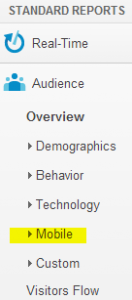 In case you missed it, Google recently announced plans to make mobile-friendliness an even more important part of its ranking algorithm. What that means is that it’s even more important than before for your website to display well on mobile devices.
In case you missed it, Google recently announced plans to make mobile-friendliness an even more important part of its ranking algorithm. What that means is that it’s even more important than before for your website to display well on mobile devices.
The reason for this is sound. It isn’t just Google trying to dictate changes that it wants you to make to your website. Google is reflecting the reality of how people use the Internet. Continue reading



 Looking for information on how much of the traffic to your website comes in via mobile devices? This is one of the basic default reports that Google Analytics offers, and it’s easy to find. Just follow these steps.
Looking for information on how much of the traffic to your website comes in via mobile devices? This is one of the basic default reports that Google Analytics offers, and it’s easy to find. Just follow these steps.